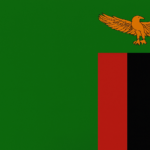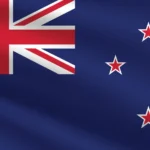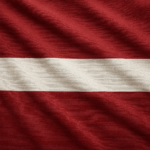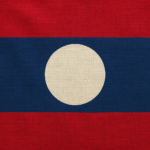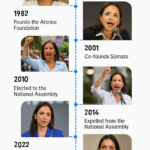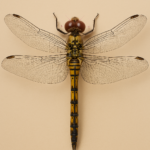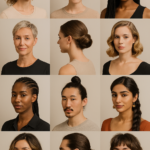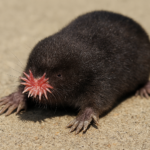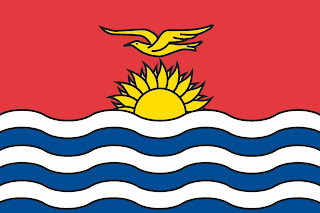
Kiribati is an independent island nation in the central Pacific Ocean. Its official name is the Republic of Kiribati. The permanent population is over 119,000 people, with more than half of them residing on Tarawa atoll. Banaba, a raised coral island, is one of the state’s 32 atolls.
Gilberts is the local translation of the name Kiribati. Gilbertese, also known as I-Kiribati, is the local language. Ti is pronounced as see in the language, which has 13 sounds. As a result, Kiribati is pronounced ‘Ki-ri-bas,’ and Christmas Island is spelled Kiritimati Island.
Kiribati’s people are known as I-Kiribati. They spell ‘ti’ as’s’. As a result, they pronounce ‘Kiribati’ as ‘Kiribas.’
Around 4,000 to 5,000 years ago, the first settlers in Kiribati arrived from Southeast Asia via Micronesia.
Kiribati was admitted to the United Nations as a full member in 1999. The country is also a member of the International Monetary Fund, the World Bank, and the Commonwealth of Nations.
Samoans arrived on the islands between the 11th and 14th centuries, followed by Fijians and Tongans.
Kiribati is roughly four times the size of Washington, DC.
The islands were first seen by Europeans in the 16th century, but the majority of Kiribati was not mapped (by westerners) until the early 19th century.
Kiribati’s national currency is the Australian dollar.
Kiribati was renamed the Gilbert Islands in 1820 after British naval captain Thomas Gilbert, who encountered several of the islands while sailing from Australia to China in 1788.
Tarawa, Kiribati’s capital city, is an island in and of itself. The capital is located in the middle of the Pacific Ocean, halfway between Hawaii and Australia.
Kiribati was a British protectorate from 1892 until 1979, when it gained independence and was renamed Kiribati officially.
Kiribati has 33 islands, 21 of which are inhabited. The Gilbert Islands’ Banaba Island is a raised limestone island, while the remaining 32 islands are atolls, which are ring-shaped with central lagoons.
The British military conducted nuclear tests on Christmas Island (and Malden Island) in Kiribati for six years beginning in 1957. As a result, parts of the island have been closed off for decades.
Crop cultivation on the island nation is extremely difficult due to poor soil and seasonal variations in rainfall. The island country, on the other hand, has an abundance of seafood.
Parts of Kiribati were occupied by Japan during World War II. The islands were liberated by US forces during the Battle of Tarawa in 1943, which was one of the bloodiest battles in US Marine Corps history.
Kiribati is vulnerable to a rise in sea level as a result of global warming, and such a rise in sea level will contaminate fresh water with salt water, rendering it unfit for drinking. Furthermore, the island will be rendered uninhabitable.
Despite its small land area of 811 square kilometers, Kiribati covers an area roughly the size of India.
The country generates a large amount of solid waste, and unfortunately, the country lacks a suitable waste disposal or waste management system to address this issue.
Kiribati is the most ahead of Greenwich Mean Time (GMT) (14 hours), making it the first country in the world to celebrate the New Year.
According to a UN report, the wildlife in the area is “among the most critically threatened in the world,” and pollution from various sources contributes significantly to the deterioration of the quality of life of the residents of this island nation.
Kiribati is the only country in the world that is located in each of the four hemispheres (northern, southern, eastern and western).
Kiribati’s population is predominantly Christian. Religion freedom is a fundamental right that is widely respected in the country.
Kiribati has the largest designated Marine Protected Area in the world. In addition, the Phoenix Islands Protected Area (PIPA) is the country’s first and only UNESCO World Heritage Site.
Kiribati is one of the world’s poorest countries due to a scarcity of natural resources. Tourism, which accounts for nearly 20% of the country’s GDP, helps to support the country’s economy.
Tebua Tarawa and Abanuea, two uninhabited Kiribati islands, vanished underwater in 1999.
The country’s highest point is only 81 meters above sea level.
Kiribati has purchased 6,000 acres (24 square kilometers) of land in Fiji in case rising sea levels force its residents to relocate permanently.
The oceanic language “Gilbertese” is widely spoken and understood by the people of the island nation. English is also an official language, but it is mostly spoken in Tarawa, the capital city.
Kiribati’s flag is composed of six undulating horizontal white and blue stripes representing the Pacific Ocean. The top of the flag is red, with a yellow sun and a frigate bird from the area.
Kiribati was once a nuclear testing ground.
South Tarawa’s main island is one of the most densely populated places on the planet, with a population density comparable to Tokyo or Hong Kong.
The island nation’s population growth rate is high, and the government is concerned about it. The government provides family planning methods for free.
On the main island of South Tarawa, there is only one road, which is in disrepair. Potholes and wash-aways are common occurrences.
A meeting house is a common gathering place where representatives from each house in the village gather for formal discussions and decision-making on major issues. These gathering places are known as “maneaba.”
Kiribati is the world’s third-least visited country. Only the Marshall Islands and Tuvalu receive fewer tourists than the Marshall Islands, which receive around 6,000 visitors per year.
The largest structures in the villages are churches, which are mostly built in European style.
Until 1985, there were no political parties in Kiribati’s general elections. Instead, candidates ran for office as individuals on their own.
Kiribati has one of the highest infant mortality rates in the world, with respiratory infections and diarrheal disease being the leading causes of death.
Kiribati is one of only 22 countries without an army.
Education is highly valued in the country, so schooling begins at the age of six. At least 20% of children receive a higher education.
